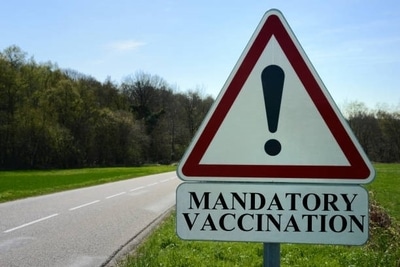By Saba Zafar, Esq.
and
Jaimee K. Wellerstein, Esq.
On August 5, 2021, California’s Department of Public Health issued a Statewide Order (the “Order”) mandating that Workers in covered Health Care Facilities[1] receive their first dose of a one-dose COVID-19 vaccine or their second dose of a two-dose COVID-19 vaccine by September 30, 2021. The Order provides that Workers may be exempt “from the vaccination requirements under section (1) only upon providing the operator of the facility a declination form, signed by the individual stating either of the following: (1) the worker is declining vaccination based on Religious Beliefs, or (2) the worker is excused from receiving any COVID-19 vaccine due to Qualifying Medical Reasons.” Workers who receive an exemption must be tested bi-weekly and wear a mask or respirator.
At first glance, it may seem that only employers who own or operate Healthcare Facilities have to comply with the Order. However, the Order’s broad definition of Workers casts a wide net encompassing many other businesses, including the service industry. While the Order is not directed at owners of these businesses, the practical impact is that Workers of businesses who report to work at Health Care Facilities – such as private security companies who work in healthcare facilities – must be vaccinated by September 30, 2021 or request and receive an exemption (and be tested bi-weekly and wear a mask or respirator).
Specifically, the term Worker includes contractual staff not employed by the Health Care Facility and includes paid or unpaid individuals who work in indoor settings where (1) care is provided to patients, or (2) patients have access for any purpose. The definition explicitly includes security personnel as well as dietary, environmental services, laundry, security, engineering and facilities management, administrative, billing and volunteer personnel. So, if a business has Workers (including those working for vendors) that report to covered Healthcare Faculties, those Workers must be vaccinated under the Order to work at the Facilities, unless they receive an exemption.
Many Health Care Facilities have already instituted policies requiring visitors (including contracted workers) to be vaccinated or submit to COVID-19 testing to enter. The Order places an onus on Health Care Facilities to maintain records of Workers’ exemption or vaccination status. Businesses that provide services to Health Care Facilities will inevitably receive requests from the Facilities to confirm that the businesses are in compliance with this Order, that is, whether employees who report to Health Care Facilities for work have been vaccinated.
Employer Takeaway:
In light of the Order and the September 30, 2021 deadline, businesses that provide services to Health Care Facilities are advised to carefully evaluate how the Order impacts their ability to provide services to Health Care Facilities. Based on this evaluation, businesses should consider drafting and implementing a policy that is aligned with the Order. Businesses should also be prepared to (1) provide reasonable accommodation contemplated by the Order and California’s Fair Employment and Housing Act to its employees, and (2) enforce the policy in connection with employees who refuse to receive a vaccine without a legally valid reason.
If you have any questions regarding this Order or require any assistance with drafting or implementing a policy compliant with the Order, please feel free to contact Bradley, Gmelich & Wellerstein LLP. We are here to help.
[1] Covered Health Care Facilities include (i) General Acute Care Hospitals; (ii) Skilled Nursing Facilities (including Subacute Facilities); (iii) Intermediate Care Facilities; (iv) Acute Psychiatric Hospitals; (v) Adult Day Health Care Centers; (vi) Program of All-Inclusive Care for the Elderly (PACE) and PACE Centers; (vii) Ambulatory Surgery Centers; (viii) Chemical Dependency Recovery Hospitals; (ix) Clinics & Doctor Offices (including behavioral health, surgical); (x) Congregate Living Health Facilities; (xi) Dialysis Centers; (xii) Hospice Facilities; (xiii) Pediatric Day Health and Respite Care Facilities; (xiv) Residential Substance Use Treatment and Mental Health Treatment Facilities.

Saba Zafar, Esq. is Special Counsel in Bradley, Gmelich & Wellerstein LLP’s Employment Law Department. Saba has over a decade of experience as an attorney, primarily in employment law. Saba focuses her practice of providing strategic advice and counsel in all aspects of employment law and workplace matters, including drafting and implementation of HR policies and procedures, Employment Handbooks, providing advice to clients on personnel issues as well as general business matters.
Prior to joining the firm, Saba was a Senior Counsel providing advice and counsel to mid-sized to large businesses on employment law compliance and day-to-day employment issues, including implementing policies and procedures, employee classifications, employment separations, managing and disciplining employees, and COVID-19 rules and regulations. Saba also handled a wide variety of employment matters in state and federal court, including cases involving wrongful termination, discrimination, and wage related cases.
In her spare time, Saba has volunteered as a Mediator for the Department of Consumer Affairs and the Orange County Human Resources Department. She was also a Volunteer Tutor for Schools on Wheels, tutoring elementary school students on skid row in Los Angeles. Prior to practicing law, Saba was a Judicial Extern for California Court of Appeal, Second Appellate District.
In her free time, Saba enjoys embarking on culinary adventures and catching up on new television shows.

Jaimee K. Wellerstein, Esq. is a Partner at Bradley, Gmelich & Wellerstein LLP, and the Head of the firm’s Employment Department. Jaimee concentrates her practice in representing employers in all aspects of employment law, including defense of wage and hour class actions, PAGA claims, discrimination, retaliation, harassment, wrongful discharge, misclassification, and other employment related lawsuits. She also provides employment counseling and training in all of these areas.
Jaimee routinely represents employers in federal and state courts and in arbitration proceedings throughout the state, as well as at administrative proceedings before the Equal Employment Opportunity Commission, the California Department of Labor Standards Enforcement, the United States Department of Labor, and other federal and state agencies.
Jaimee assists as a Legal Advisor to CALSAGA, and is a member of ASIS International. She is rated AV-Preeminent by Martindale-Hubbell, the highest peer rating available. jwellerstein@bgwlawyers.com

